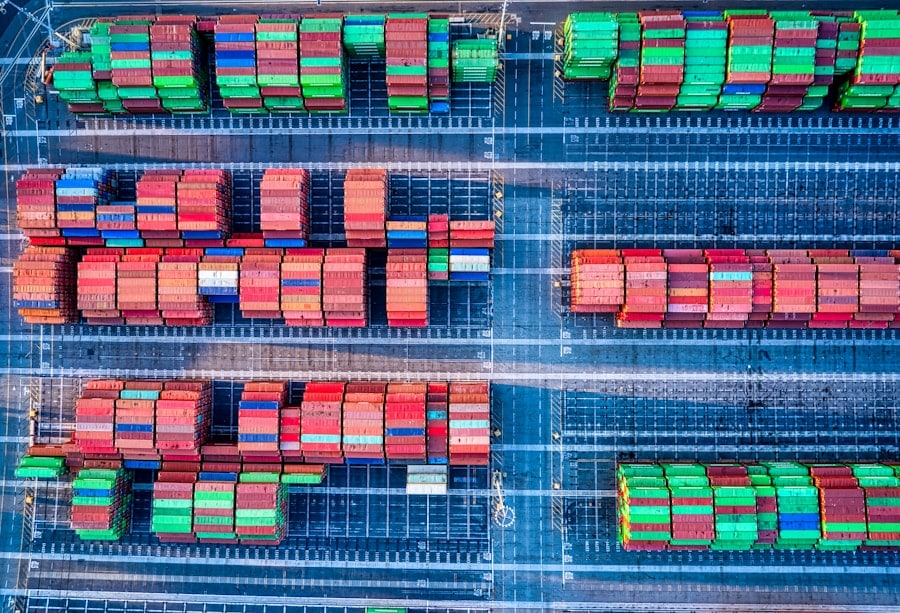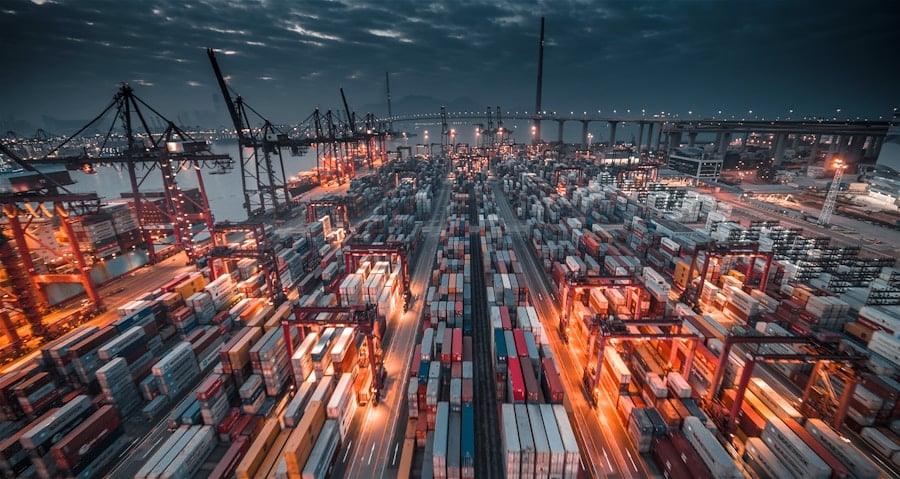The integration of artificial intelligence (AI) into supply chain management has emerged as a transformative force, reshaping how businesses operate in an increasingly complex and volatile environment. Supply chains are the backbone of global commerce, encompassing the flow of goods, information, and finances from suppliers to consumers.
AI offers innovative solutions that enhance the ability of supply chains to withstand shocks and adapt to changing circumstances. AI technologies, including machine learning, natural language processing, and robotics, are being harnessed to improve efficiency, reduce costs, and enhance decision-making processes within supply chains. By analyzing vast amounts of data, AI can identify patterns and trends that human analysts might overlook, enabling organizations to anticipate disruptions and respond proactively.
This capability is particularly crucial in today’s fast-paced market, where consumer preferences shift rapidly and unexpected events can have cascading effects on supply chain operations. As businesses strive for resilience, the role of AI becomes increasingly pivotal in ensuring that supply chains can not only survive but thrive in the face of adversity.
Key Takeaways
- AI plays a crucial role in enhancing supply chain resilience by providing predictive analysis, demand forecasting, real-time monitoring, risk assessment, and collaboration capabilities.
- Predictive analysis using AI helps in identifying potential disruptions and enables proactive decision-making to mitigate risks in the supply chain.
- AI-driven demand forecasting and inventory management optimize inventory levels, reduce stockouts, and improve customer satisfaction.
- Real-time monitoring and adaptive decision-making with AI enable supply chain managers to respond quickly to changing conditions and make informed decisions.
- AI-powered risk assessment and mitigation in supply chains help in identifying and addressing potential vulnerabilities, ensuring business continuity.
The Role of AI in Predictive Analysis for Supply Chain Management
Predictive analysis is a cornerstone of effective supply chain management, allowing organizations to forecast future demand and optimize their operations accordingly. AI enhances predictive analysis by leveraging advanced algorithms that can process and analyze historical data alongside real-time information. For instance, machine learning models can be trained on past sales data, seasonal trends, and external factors such as economic indicators or weather patterns to generate accurate demand forecasts.
This capability enables companies to make informed decisions about inventory levels, production schedules, and resource allocation. Moreover, AI-driven predictive analysis can significantly reduce the bullwhip effect—a phenomenon where small fluctuations in consumer demand lead to larger variances in supply chain orders. By providing more accurate forecasts, AI helps organizations maintain optimal inventory levels, minimizing excess stock and reducing carrying costs.
For example, a retail company utilizing AI for predictive analysis might analyze customer purchasing behavior during holiday seasons to adjust its inventory strategy accordingly. This proactive approach not only enhances operational efficiency but also improves customer satisfaction by ensuring that products are available when consumers want them.
AI-Driven Demand Forecasting and Inventory Management

Demand forecasting is a critical component of supply chain management, as it directly influences inventory management strategies. Traditional forecasting methods often rely on historical sales data and simplistic models that may not account for the complexities of modern markets. In contrast, AI-driven demand forecasting employs sophisticated algorithms that can analyze diverse data sources—such as social media trends, economic indicators, and even competitor pricing strategies—to generate more accurate predictions.
For instance, a beverage company might use AI to analyze social media sentiment regarding its products alongside historical sales data to predict demand for a new flavor launch. By incorporating real-time insights into its forecasting model, the company can adjust its production schedules and inventory levels accordingly. This level of agility not only reduces the risk of stockouts but also minimizes waste associated with overproduction.
Furthermore, AI can continuously learn from new data inputs, refining its forecasting models over time and adapting to changing market conditions. In addition to enhancing demand forecasting accuracy, AI also plays a vital role in optimizing inventory management practices. By integrating AI with inventory management systems, organizations can automate reorder processes based on real-time demand signals.
For example, an e-commerce platform might implement an AI-driven inventory management system that automatically adjusts stock levels based on current sales trends and anticipated demand fluctuations. This automation reduces the burden on supply chain managers while ensuring that products remain available for customers. Source: IBM – Demand Forecasting
Real-time Monitoring and Adaptive Decision Making with AI
The ability to monitor supply chain operations in real-time is essential for maintaining resilience in the face of disruptions. AI technologies enable organizations to gather and analyze data from various sources—such as IoT devices, sensors, and enterprise resource planning (ERP) systems—providing a comprehensive view of supply chain performance. This real-time visibility allows businesses to identify potential issues before they escalate into significant problems.
For example, a manufacturing company might deploy IoT sensors on its production equipment to monitor performance metrics such as temperature, vibration, and operational efficiency. By analyzing this data with AI algorithms, the company can detect anomalies that may indicate equipment failure or production delays. This proactive approach allows for timely interventions, such as scheduling maintenance or reallocating resources to mitigate disruptions.
Adaptive decision-making is another critical aspect of supply chain resilience that is enhanced by AI. With real-time data at their fingertips, supply chain managers can make informed decisions quickly in response to changing conditions. For instance, if a natural disaster disrupts transportation routes, an AI-powered system can analyze alternative logistics options and recommend adjustments to shipping schedules or routes.
This agility not only minimizes delays but also helps maintain customer satisfaction by ensuring timely deliveries.
AI-powered Risk Assessment and Mitigation in Supply Chains
Risk assessment is an integral part of supply chain management, as organizations must navigate various uncertainties that can impact their operations. AI enhances risk assessment capabilities by analyzing vast datasets to identify potential vulnerabilities within the supply chain. By employing machine learning algorithms, businesses can assess risks related to supplier reliability, geopolitical factors, market fluctuations, and environmental concerns.
For instance, a global electronics manufacturer might use AI to evaluate the risk associated with sourcing components from different suppliers across various regions. By analyzing historical performance data, geopolitical stability indices, and economic indicators, the AI system can provide insights into which suppliers pose higher risks based on their location or past performance. This information enables the company to make informed decisions about supplier selection and diversification strategies.
In addition to identifying risks, AI also plays a crucial role in developing mitigation strategies. By simulating various scenarios based on potential disruptions—such as supplier failures or transportation delays—AI can help organizations devise contingency plans that minimize the impact of these events. For example, a food distribution company might use AI-driven simulations to assess the effects of a sudden increase in demand due to a public health crisis.
By preparing alternative sourcing strategies and adjusting inventory levels in advance, the company can ensure continuity of supply during challenging times.
AI-enabled Collaboration and Communication in Supply Chain Networks

Enhanced Supply Chain Visibility
These platforms leverage AI algorithms to analyze shared data and generate actionable insights that benefit all parties involved. For example, a fashion retailer might implement an AI-powered collaboration platform that connects its suppliers with real-time sales data and inventory levels. By sharing this information transparently, suppliers can better understand demand patterns and adjust their production schedules accordingly. This collaborative approach not only improves efficiency but also fosters stronger relationships between stakeholders.
Streamlined Communication
Furthermore, AI-driven communication tools can streamline interactions among supply chain partners by automating routine tasks such as order processing and status updates. Chatbots powered by natural language processing can handle inquiries from suppliers or customers efficiently, freeing up human resources for more strategic tasks.
Improved Customer Experience
Case Studies of AI Implementation in Supply Chain Resilience
Numerous organizations have successfully implemented AI technologies to enhance their supply chain resilience. One notable example is Unilever, which has leveraged AI-driven analytics to optimize its supply chain operations across various product lines. By utilizing machine learning algorithms to analyze consumer behavior data and market trends, Unilever has improved its demand forecasting accuracy significantly.
This enhancement has allowed the company to reduce excess inventory while ensuring product availability during peak seasons. Another compelling case study is that of Amazon, which has integrated AI into nearly every aspect of its supply chain management processes. From predictive analytics for demand forecasting to automated warehousing systems powered by robotics and machine learning algorithms, Amazon exemplifies how AI can drive efficiency and resilience in supply chains.
The company’s ability to adapt quickly to changing consumer preferences—such as during the COVID-19 pandemic—demonstrates the effectiveness of its AI-driven strategies in maintaining operational continuity. Additionally, Coca-Cola has embraced AI technologies to enhance its supply chain resilience by optimizing its distribution network. The company employs machine learning algorithms to analyze historical sales data alongside external factors such as weather patterns and local events.
This analysis enables Coca-Cola to adjust its distribution strategies dynamically based on anticipated demand fluctuations in different regions.
Future Trends and Opportunities for AI in Supply Chain Resilience
As technology continues to evolve rapidly, the future of AI in supply chain resilience holds immense potential for further advancements. One emerging trend is the increasing integration of blockchain technology with AI systems. Blockchain’s decentralized nature enhances transparency and traceability within supply chains while AI’s analytical capabilities provide valuable insights into operational performance.
This combination could lead to more secure and efficient supply chains that are better equipped to handle disruptions. Another opportunity lies in the development of autonomous supply chain systems powered by AI and robotics. As automation technologies advance, organizations may increasingly rely on autonomous vehicles for transportation and drones for last-mile delivery.
These innovations could significantly reduce lead times and enhance flexibility within supply chains. Moreover, the growing emphasis on sustainability presents an opportunity for AI to play a pivotal role in creating environmentally responsible supply chains. By analyzing data related to carbon emissions, resource consumption, and waste generation, AI can help organizations identify areas for improvement and develop strategies that align with sustainability goals.
In conclusion, the integration of artificial intelligence into supply chain management is revolutionizing how businesses approach resilience in an ever-changing landscape. From predictive analysis and demand forecasting to real-time monitoring and risk assessment, AI technologies are empowering organizations to navigate complexities with agility and foresight. As companies continue to explore innovative applications of AI within their supply chains, the potential for enhanced resilience will only grow stronger in the years ahead.
A related article discussing the best free software for home remodeling can be found here. This article explores how technology is revolutionizing the way we approach home improvement projects, much like how AI is optimizing supply chain resilience during crises. Both articles highlight the importance of leveraging innovative tools to enhance efficiency and effectiveness in different areas of our lives.
FAQs
What is AI?
AI, or artificial intelligence, refers to the simulation of human intelligence in machines that are programmed to think and act like humans. This includes tasks such as learning, problem-solving, and decision-making.
How is AI used in supply chain management?
AI is used in supply chain management to optimize processes, improve forecasting accuracy, enhance inventory management, and streamline logistics. It can also help in identifying potential disruptions and developing strategies to mitigate their impact.
How does AI optimize supply chain resilience during crises?
AI optimizes supply chain resilience during crises by providing real-time visibility into the entire supply chain, enabling quick decision-making, predicting potential disruptions, and offering alternative solutions to minimize the impact of the crisis.
What are the benefits of using AI in supply chain management during crises?
The benefits of using AI in supply chain management during crises include improved agility and responsiveness, enhanced risk management, better demand forecasting, reduced operational costs, and increased overall resilience to disruptions.
Are there any challenges in implementing AI in supply chain management?
Challenges in implementing AI in supply chain management include data quality and availability, integration with existing systems, change management, and the need for skilled personnel to manage and interpret AI-generated insights.

